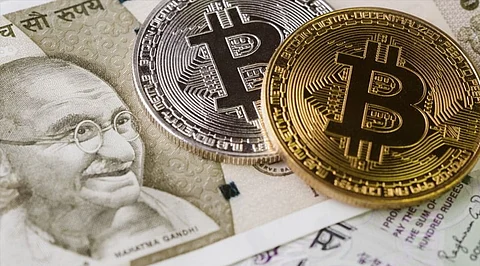

Even though its value is not hailed greatly across the globe, the Indian Rupee holds a significant place in the world economy and is one of the trusted currencies. But will it continue to hold its position in the coming years? A clear answer is yet to be obtained. However, according to the evaluation of bitcoin's stance in the country, cryptocurrency vs Indian Rupee is anticipated to have a tough fight ahead.
The popularity of famous cryptocurrencies like bitcoin and ethereum has been hitting a record high in India. Besides, many Indian companies are also coming up with a futuristic aspect to try and accept cryptocurrency payments at every end. Despite bitcoin's dominance in the country, India is yet to take an official step either to wipe out or legalize cryptocurrency trading. Initially, Indian officials were varying the whole cryptocurrency idea. The ruling party, BJP, tried its best to streamline banking to bring the movement of money under the scanner. But things took a different turn when Indian's fell for bitcoin. Although the Reserve Bank of India has announced a blanket ban on RBI-regulated entities providing services to persons/settling transactions involving cryptocurrencies, the Supreme Court came to crypto enthusiasts' rescue by lifting the limitation. After realizing the unsettling debate on cryptocurrency usage in the country, the government formed a committee to come up with an effective solution after carefully assessing the ground-level usage of bitcoin. The country's acceptance of digital currency has raised questions over cryptocurrency vs Indian Rupee on the practical usage.
To understand whether cryptocurrency can serve as a reserve currency, we need to go through the market trend and current situation of the digital currency sphere. Indian Rupee is very different from the much-adored US dollar. US dollar has a different story to tell. For many centuries now, the US dollar has remained the global standard currency. In the late 1900s, the national currency was even pegged to the gold prices, helping the country keep up its financial statute. The scenario is completely different for Indian Rupee. The Indian Rupee has always stood alone and winded the financial status of the country.
On the other hand, bitcoin came to effect in 2008. A person under the pseudonym Satoshi Nakamoto unleashed the blockchain network, which eventually led to the creation of bitcoin. The decentralized nature and its feature to record every little change over an open-sourced format sought many investors' attention. Besides being an investment model, bitcoin is also a big job for bitcoin miners. They solve mathematical puzzles and clear algorithms to get their hand on bitcoin. Indians can bank their cryptocurrency assets without being dependent on the Indian Rupee.
At a time when cryptocurrency is yet to be regulated under government rules, many companies are jumping into the digital currency sphere by accepting bitcoin payments. After the Supreme Court stepped over the RBI regulation and scrapped it, the country experienced a massive surge in cryptocurrency investment. Although heavy adoption of a decentralized currency could put the taxpayers at stake, Indian is still gearing up its game for the next big crypto wind. Some of the Indian companies that accept cryptocurrency are,
One thing that was proved by RBI's resistance to cryptocurrency is that the national bank can never go hand in hand with digital currency transactions. Fortunately, the central bank has unleashed Central Bank Digital Currency (CBDC) later. It proved the fact that RBI was not really against digital currencies, but it just feared that the invasion of cryptocurrency could blur the line between regulation and illegal.
CBDC is a virtual currency with the same functionalities as fiat currencies. While other cryptocurrencies resist regulations, CBDC itself is regulated by the country's central bank, the RBI. The central bank is currently carefully analyzing the pros and cons of CBDC and is anticipated to streamline the regulated digital currency in the coming years.
According to the discussion of the upcoming draft bill, cryptocurrency will be taken into consideration as commodities or assets in India. The bill is expected to unfold possibilities of taxation for cryptocurrencies including laws for payments, investments, and other commodities.
Although the private sector is gearing up its game to accelerate cryptocurrency usage, it will take a lot of time for Indians to adopt the concept and streamline it. In the meantime, they will also have to tackle government regulations and taxation. However, cryptocurrency is really waging a war against every country's national currency and India is not an exception.
Join our WhatsApp Channel to get the latest news, exclusives and videos on WhatsApp
_____________
Disclaimer: Analytics Insight does not provide financial advice or guidance. Also note that the cryptocurrencies mentioned/listed on the website could potentially be scams, i.e. designed to induce you to invest financial resources that may be lost forever and not be recoverable once investments are made. You are responsible for conducting your own research (DYOR) before making any investments. Read more here.
